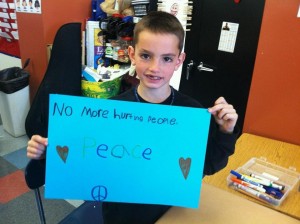 David pays tribute and dedicates the show to 8 year old Martin Richard who lost his life in the Boston Bombing.
David pays tribute and dedicates the show to 8 year old Martin Richard who lost his life in the Boston Bombing.
This show is about hope, in a world that can appear very violent through the media outlets yet the statistics show clearly that world is less violent and is becoming less every year.
David shares work by Steven Pinker that show that violence is in decline.
David also shares his experience with the wars in Ireland and Israel that he experienced personally and he shares his experience with the youth guerillas in Guatemala.
David talks about how education can help end the cycles of violence and hatred that separate people from each other and shares how education can free young girls in third world countries from child marriages, mutilation through circumcision, teenage pregnancy and more
He asks you the listener to listen to your own judgments of others and challenges you to build bridges of understanding between and those that you are in conflict with or in judgment of.
As Kickass Life practitioners we can build a better world one person at a time, one less judgment at a time.
His call to action is one of hope.
Some notes from a Stephen Pinker article that David shared on the show:
WASHINGTON POST — It seems as if violence is everywhere, but it’s really on the run.
Yes, thousands of people have died in bloody unrest from Africa to Pakistan, while terrorists plot bombings and kidnappings. Wars drag on in Iraq and Afghanistan. In peaceful Norway, a man massacred 69 youths in July. In Mexico, headless bodies turn up, victims of drug cartels. This month eight people died in a shooting in a California hair salon.
Yet, historically, we’ve never had it this peaceful.
That’s the thesis of three new books, including one by prominent Harvard psychologist Steven Pinker. Statistics reveal dramatic reductions in war deaths, family violence, racism, rape, murder and all sorts of mayhem.
In his book, Pinker writes: “The decline of violence may be the most significant and least appreciated development in the history of our species.”
And it runs counter to what the mass media is reporting and essentially what we feel in our guts.
Pinker and other experts say the reality is not painted in bloody anecdotes, but demonstrated in the black and white of spreadsheets and historical documents. They tell a story of a world moving away from violence.
In his new book, “The Better Angels of Our Nature: Why Violence Has Declined,” Pinker makes the case that a smarter, more educated world is becoming more peaceful in several statistically significant ways.
His findings are based on peer-reviewed studies published by other academics using examinations of graveyards, surveys and historical records:
_ The rate of genocide deaths per world population was 1,400 times higher in 1942 than in 2008.
_ There were fewer than 20 democracies in 1946. Now there are close to 100.
Meanwhile, the number of authoritarian countries has dropped from a high of almost 90 in 1976 to about 25 now.
Pinker says one of the main reasons for the drop in violence is that we are smarter. IQ tests show that the average teenager is smarter with each generation. The tests are constantly adjusted to keep average at 100, and a teenager who now would score a 100 would have scored a 118 in 1950 and a 130 in 1910.
So this year’s average kid would have been a near-genius a century ago. And that increase in intelligence translates into a kinder, gentler world, Pinker says.
“As we get smarter, we try to think up better ways of getting everyone to turn their swords into plowshares at the same time,” Pinker said in an interview. “Human life has become more precious than it used to be.”
Pinker argued his case in a commentary this past week in the scientific journal Nature. He has plenty of charts and graphs to back up his claims, including evidence beyond wartime deaths – evidence that our everyday lives are also less violent:
_ Murder in European countries has steadily fallen from near 100 per 100,000 people in the 14th and 15th centuries to about 1 per 100,000 people now.
_ Murder within families. The U.S. rate of husbands being killed by their wives has dropped from 1.2 per 100,000 in 1976 to just 0.2.
For wives killed by their husbands, the rate has slipped from 1.4 to 0.8 over the same time period.
_ Rape in the United States is down 80 percent since 1973. Lynchings, which used to occur at a rate of 150 a year, have disappeared.
Discrimination against blacks and gays is down, as is capital punishment, the spanking of children, and child abuse.
He examines body counts, rapes, sacrifice and slavery in the Bible, using an estimate of 1.2 million deaths detailed in the Old Testament. He describes forms of torture used in the Middle Ages and even notes the nastiness behind early day fairy tales, such as the evil queen’s four gruesome methods for killing Snow White along with a desire to eat her lungs and liver.
Even when you add in terrorism, the world is still far less violent, Pinker says.
“Terrorism doesn’t account for many deaths. Sept. 11 was just off the scale. There was never a terrorist attack before or after that had as many deaths. What it does is generate fear,” he said.
It’s hard for many people to buy the decline in violence. Even those who deal in peace for a living at first couldn’t believe it when the first academics started counting up battle deaths and recognized the trends.
In 1998, Andrew Mack, then head of strategic planning for U.N. Secretary General Kofi Annan, said a look at the statistics showed the world was becoming less violent. The reaction from his professional peacekeeping colleagues?
“Pffft, it’s not true,” they told Mack, arguing that the 1990s had to be the worst decade in U.N. history. It wasn’t even close.
He and Goldstein believe it’s possible that an even greater drop in violence could occur in the future.
Goldstein says there’s a turn on a cliche that is apt: “We’re actually going from the fire to the frying pan. And that’s progress. It’s not as bad as the fire.”
Links
Ted Talks – Steven Pinker – The Surprising Decline in Violence –
http://www.ted.com/talks/steven_pinker_on_the_myth_of_violence.html
Other Articles from Steven Pinker
http://dissidentvoice.org/2012/12/steven-pinker-on-the-alleged-decline-of-violence/
David’s view:


